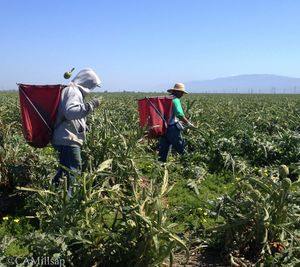Travel: Salinas Agritourism: From field to table
The men walked along the rows of artichokes, following long, straight, ribbons of green that stretched out to the horizon as far as the eye could see. Moving toward the big mobile processing trucks parked on the road that marked the boundary of the field, they harvested artichokes without stopping. As they walked, in one swift motion, they cut and then tossed the artichokes over a shoulder into the strong fabric baskets strapped to their backs. When they reached the truck, the men dumped the contents of the baskets, put them back on, turned around and started again, this time moving in the opposite direction, marching toward another road and another truck.
A few smiled at the crowd gathered along the side of the road watching and taking photos, but most faces were unreadable as they passed us. There was still a lot of work to be done.
On the open trailer, an artichoke processing plant on wheels, men and women wearing hair nets and gloves sat one behind the other in a line of busy hands that didn’t pause as they quickly sorted, washed and packed the fruit. The boxes were filled and taken away.
The company they worked for, Ocean Mist Farms, has a four-hour “cut to cool” policy. Everything must move from the field to the cooler in that time and an elaborate system of bar codes and time stamps tracks it all along the way as the produce moves from the field to boxes to coolers to tables around the world.
I’d joined a private tour of the artichoke mega-producer’s fields and distribution center and it was an eye-opening experience.
Like most people, I’m relatively ignorant of the process by which my food arrives on my table. Oh, I read labels and worry about food safety, but beyond that I don’t know much. I like--I need--fresh vegetables all year, even in winter, even though I live in a place where nothing grows in the winter. So I depend, like most consumers, on the good practices of growers and producers in places like Salinas, Castroville and Monterey County, California.
Walking through the distribution center I noticed pallets of produce labeled for its destination, for the stores where it would be sold. Sitting side by side were cases destined for Kroger stores, Trader Joe’s and for Wal Mart. Food democracy in action.
I found this distribution to be a most interesting thing. We put such a negative label on “big.” Big is bad. Big is careless and always looking for a shortcut. Big is for “them,” not for us. We forget it takes a big effort to feed a hungry, demanding, world, even our small corner of the world.
At dinner that night I ordered an artichoke with my meal. Marinated and fire roasted, it was perfectly prepared. As I pulled each leaf from the cluster, dipping it in sauce and then stripping the tender meat with my teeth, I thought about the process that brought it to me. I could see the faces of the men who’d walked past me in the field, the people washing and packing what had been picked or driving the forklifts speeding pallets into coolers or onto trucks.
My artichoke now had a story. The big company behind it was suddenly small and intimate to me.
Although the fields are open to the public during the annual Artichoke Festival in Castroville, I had an exclusive look into the Ocean Mist Farms processing center and I came away thinking an occasional public tour might be a good thing. It’s reassuring to see the path our food has followed, that there isn’t always a caste system to quality and the same food really can be available to all of us.
Chances are, unless it was raised in our own backyards or in the fields of an area farmer, our produce was prepared in one of the fields of a company big enough to grow, process and distribute what we desire. To step into the fields, to follow the boxes, to see the safeguards and quality control is a good thing. To put a human face behind an artichoke, brussels sprout or head of iceberg lettuce shrinks even the biggest company profile.
Cheryl-Anne Millsap’s audio essays can be heard on Spokane Public Radio and on public radio stations across the country. She is the author of “Home Planet: A Life in Four Seasons” and can be reached at catmillsap@gmail.com
